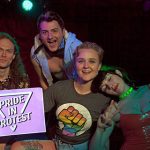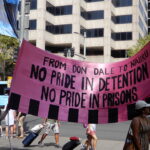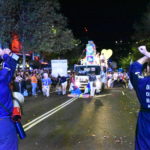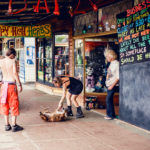Alternate Mardi Gras to March on Oxford: An Interview With Pride in Protest’s Evan Van Zijl
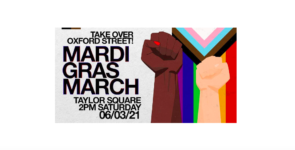
Due to the global pandemic, the Sydney Gay and Lesbian Mardi Gras Parade will take place at the Sydney Cricket Ground.
However, the event’s spiritual home, Oxford Street Darlinghurst, will not be left wanting, as an alternative march is set to take place, which, in many ways, will be more representative of the statement made by the original marchers, now known as the 78ers.
The initial Mardi Gras march in 1978 was a protest for queer rights, and more broadly human rights in general. At the time, homosexuality was still criminalised in NSW and LGTBIQ communities were relegated to the margins.
In recognising the radical roots of the first march, the organisers of the Take Over Oxford Street Mardi Gras March 2021 are taking the opportunity afforded by the relocation of the official event to mobilise supporters behind a fresh set of five protest demands.
The demands of the day
The first demand is to kill the religious freedoms bills. Currently, there’s legislation before both federal and NSW parliaments containing laws that purport to protect those of faith but are actually a means to allow conservative Christians to discriminate against LGBTIQ communities.
The second demand is to bring the mandatory detention of refugees and asylum seekers to an end. The Australian government continues to detain over 260 asylum seekers and refugees on Nauru and in Papua New Guinea, while there are over 120 now held in hotels in Australia.
The third demand is the advancement of the Black Lives Matter movement. In the Australian setting, First Nations people are vastly overrepresented in the nation’s prison system and Aboriginal and Torres Strait Islander people continue to die in the custody of police and corrections.
The full decriminalisation of sex work nationwide is the fourth protest demand. While NSW was the first jurisdiction globally to decriminalise sex work in 1995, there’s still room for reform. And in the majority of Australian jurisdictions, sex work continues to be criminalised at least in part.
The final protest demand is the decriminalisation of personal drug possession and use. The drug war is internationally recognised as a failure. It’s now understood to have increased the harms associated with drug use. And the Portuguese model of decriminalisation is widely seen as the way forward.
Putting the pride in protest
The 1978 Mardi Gras march was violently suppressed by NSW police. The Sydney Morning Herald published the names of the 53 marchers who were arrested, which was an act that could prove detrimental in a time when homosexuality was a crime.
One of the organisers of this year’s alternate march, Pride in Protest released an open letter to the Sydney Gay and Lesbian Mardi Gras board last year, calling for it to prohibit NSW police and Corrective Services NSW from entering floats in the parade. Yet, the letter was all but ignored.
Sydney Criminal Lawyers spoke to Pride in Protest spokesperson Evan Van Zijl about the corporatisation of the official event, the concept of defunding police and how the liberation of one group serves to liberate all.
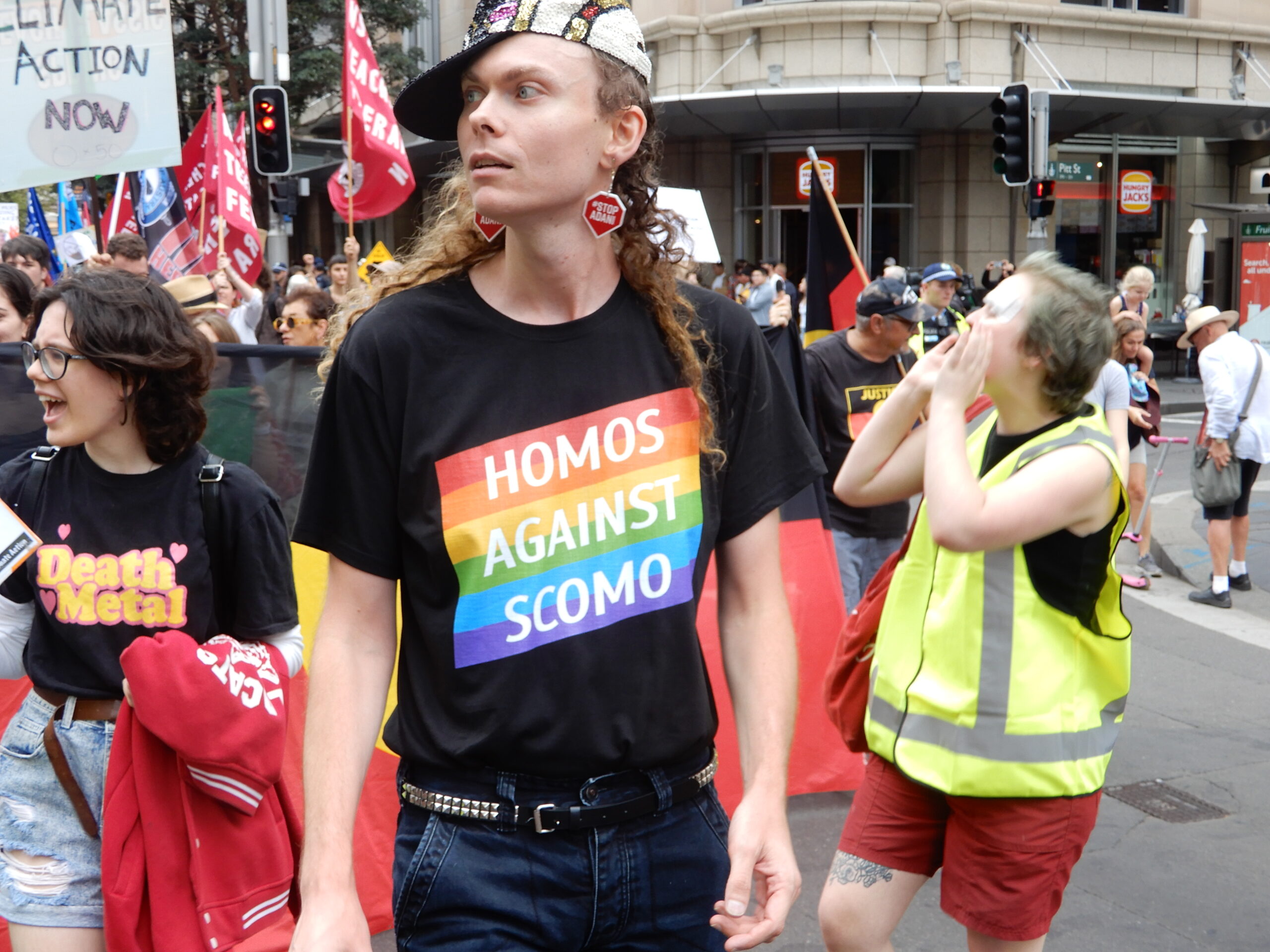
Firstly, due to the COVID-19 pandemic, the official Mardi Gras parade is taking place at the Sydney Cricket Ground.
Pride in Protest is taking the opportunity to run an alternative Mardi Gras. Theopen letter will take place on the same day as the official event.
Evan, why aren’t Pride in Protest, and the other organisers, simply making this protest statement as part of the regular parade? Why do you need an alternate march?
First of all, most years we would ordinarily march as part of the parade, because we see it not only as being an event that’s run by the board, but it’s something the community owns and participates in.
This year we felt that since the board had walked away from Oxford Street – and effectively privatised the event with a much smaller float turnout – that it’s important the community has an alternative option.
So, while the board might have walked away from Oxford Street, we haven’t. And we won’t grant Fred Niles’ prayers on this occasion.
We’ve organised what we believe is a real Mardi Gras in a sense that it’s a pride celebration and a pride protest on Oxford Street.
At 2 pm at Taylor Square we will talk about fighting the religious freedoms bills, standing up for Black Lives Matter and saying there’s no pride in detention.
We are also supporting the decriminalisation of sex work and the decriminalisation of drugs, which are used to beat down on our communities.
As you’ve just mentioned, the alternate Mardi Gras protest has five demands. One is killing the religious freedoms bills, which have been introduced at the federal and state level.
With Scott Morrison at the lead, the Coalition’s religious right has been waging a religious freedoms crusade that has always had LGBTIQ communities as its primary focus. One Nation’s Mark Latham has picked up the cause in this state.
How would you sum up what the religious freedoms debate is about?
The religious freedoms debate is the reincarnation of every attack on our job security, our housing security, our rights as queer people that goes back to the day when the press published the names of people in the 1978 march to get them fired.
It’s a reiteration of that same songbook. And it’s there to try and justify their positions as homophobes and to declare that they are free to discriminate on the basis of their religion.
They honestly disrespect spiritual freedom, which we can see in the way the Djab Wurrung sacred tree was just demolished. And so much for religious freedoms when Muslims need protection.
But, suddenly, when the prime minister or Mark Latham want to discriminate, then they want religious freedoms, so they can empower bosses to fire us and empower newspapers to vilify us.
Another key focus is advancing the Black Lives Matter movement. What does that mean in terms of changes within wider society?
Our analysis of Black Lives Matter is that no life can matter until Black Lives Matter. And we can’t defend black lives or queer lives or anyone’s lives until we do something about the police.
Black people are the most heavily incarcerated people in the world, especially First Nations people in Australia.
To tackle that problem, our collective believes there needs to be defunding, disarming and, ultimately, dismantling of the police, as well as the corrections system.
This requires a substantial shift in society. But, as it stands, police are violent enforcers. They’re not a solution to a lot of the things that we presume they are.
Full decriminalisation of sex work is another key demand. What are the issues facing sex workers under current systems? And why is this a primary focus?
One of the key things in challenging police powers is identifying that there are a whole range of crimes that are effectively invented by the system.
These are social crimes, which have no victims. They include sex work, drug use and homosexuality.
These crimes are really ways to bolster police power and fill up gaols. They’re proxies for discrimination. Sex work is one example of that.
We believe that sex workers are workers. They deserve labour rights. They deserve the right to organise in unions. And that means full decriminalisation.
We don’t have full decriminalisation across the nation. We have different models in each state. And that has different ramifications for people.
You can really look at the question of women’s liberation in connection with gay liberation in connection with sex workers’ rights.
Every time that there’s an advance for how we understand sex and its freedoms there’s an advance collectively. So, supporting each other is huge.
Also, when you consider how many trans people for one reason or another – whether that’s exclusion from the economy or otherwise – are in sex work, you can’t really say you have solidarity with them while criminalising in any way the job that many trans people do.
Although, I stress I’m not a spokesperson for sex workers.
Since its inception in 2018, Pride in Protest has asserted it’s about bringing back the radical protest roots that Mardi Gras once embodied.
How would you describe the legacy that your organisation is building upon?
Our view is that pride protest, gay liberation and trans liberation is an international movement. You can see the beginnings of that in the Compton’s riot and you can see the beginnings of that in Stonewall. That’s what the Mardi Gras in 1978 was commemorating.
When people had their pride march here, and it escalated into anti-police protests, people were chanting things like, “Stop attacks on gays, women and blacks.” That’s the sentiment of solidarity.
We are all in this together and all our liberation is tied up in each other’s. If you fight for the rights of one sector, then you fight for the rights of all. That’s something that really informs our practice today, and what we believe Mardi Gras and other sites of pride should be about.
It’s our community standing together as one, demanding not just to celebrate our visibility, but to make our resistance visible and connected on all of these fronts, so that it’s actually challenging the system that oppresses us all.
So, given that, how would you sum up the way the Sydney Gay and Lesbian Mardi Gras organisation is operating today?
There are many hard-working community volunteers, who invest their time in the Sydney Gay and Lesbian Mardi Gras. And for many people, including myself, it’s been a really important space to be public, to take up space and to be seen.
But there’s a trend within certain sections of Mardi Gras that have neo-liberalised it. They’ve basically sought to subcontract themselves out to sponsors and sections of government.
So, we see police being heavily promoted. We see ANZ being heavily promoted. And it really needs to be asked if that’s for queer people or is it for those government departments and corporations.
None of these organisations need to go through approval processes to get floats, but they do get heavily promoted.
Is the Mardi Gras board there as a subcontractor for these organisations or are they there for the community?
The fact that they did not respond to our open letter in any sincere way about the police makes you wonder. Our open letter included many people who work in Mardi Gras as musicians and performers.
So, that shows that the majority of the board are much less interested in the queer community at times, than they are in the interests of the corporations and government departments, like the police.
And lastly, Evan, over three and half thousand people have indicated their interest in the alternative Mardi Gras March. What can those who attend expect on the day?
We’ll be converging on Taylor Square which is one of the key spaces of the original 1978 Mardi Gras.
We will have a number of speakers, including Greens MP Jenny Leong, chair of the First Nations working group of the Scarlet Alliance sistergirl Rosa Curtis, Fa’afafine Samoan lawyer and refugee rights advocate Phineas Hartson and Community Action for Rainbow Rights co-convenor April Holcombe.
We’ll be marching down to Hyde Park. We will have one of the biggest trans pride flags in the country – if not the world – that we’ve had specially ordered.
Then we’re going to get to Hyde Park and have some festivities on the other end, including a gay community fashion parade, a barbeque – which will by donation and no one turned away – and a sound system.
Hopefully, we will see everyone there.



